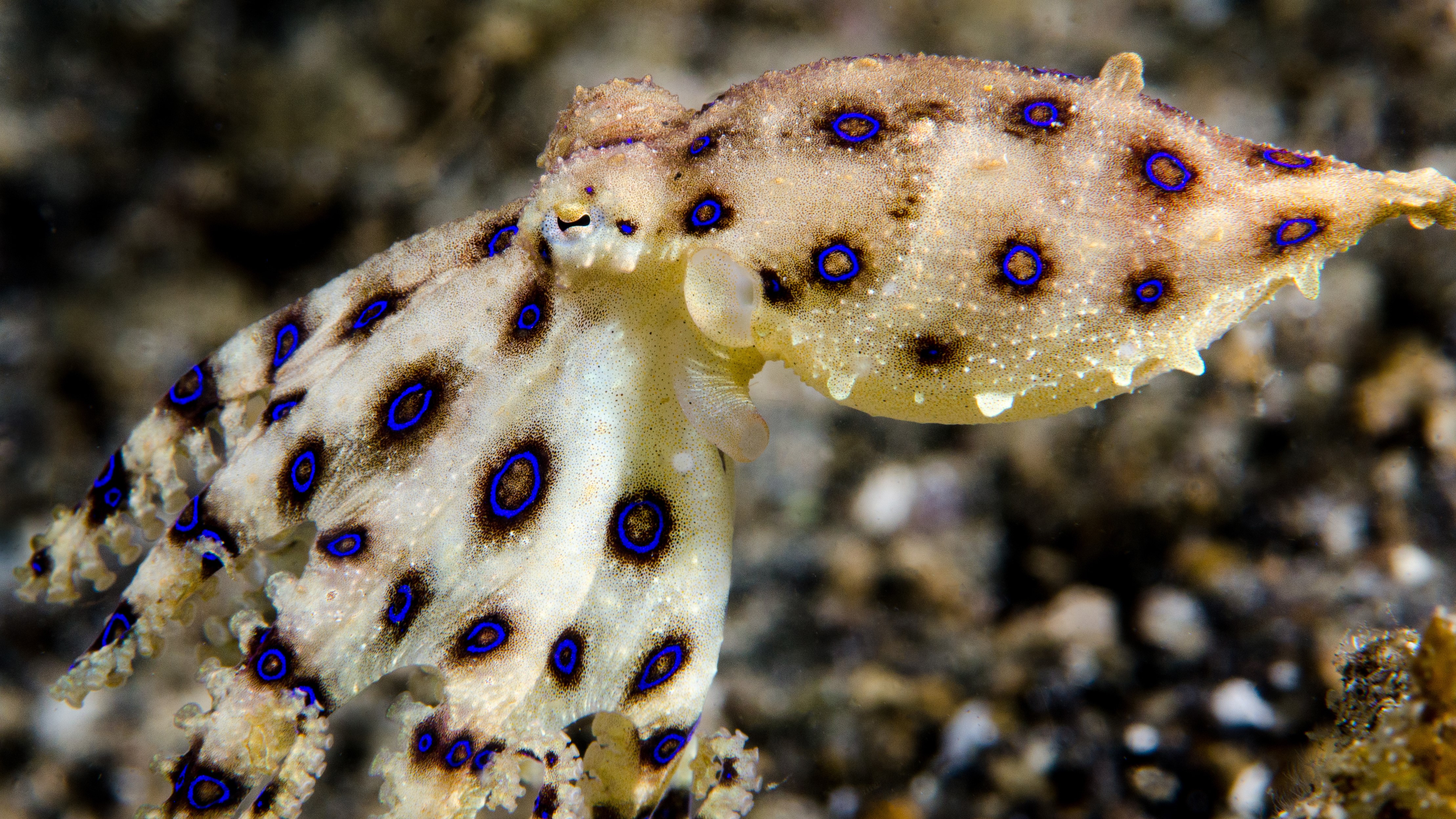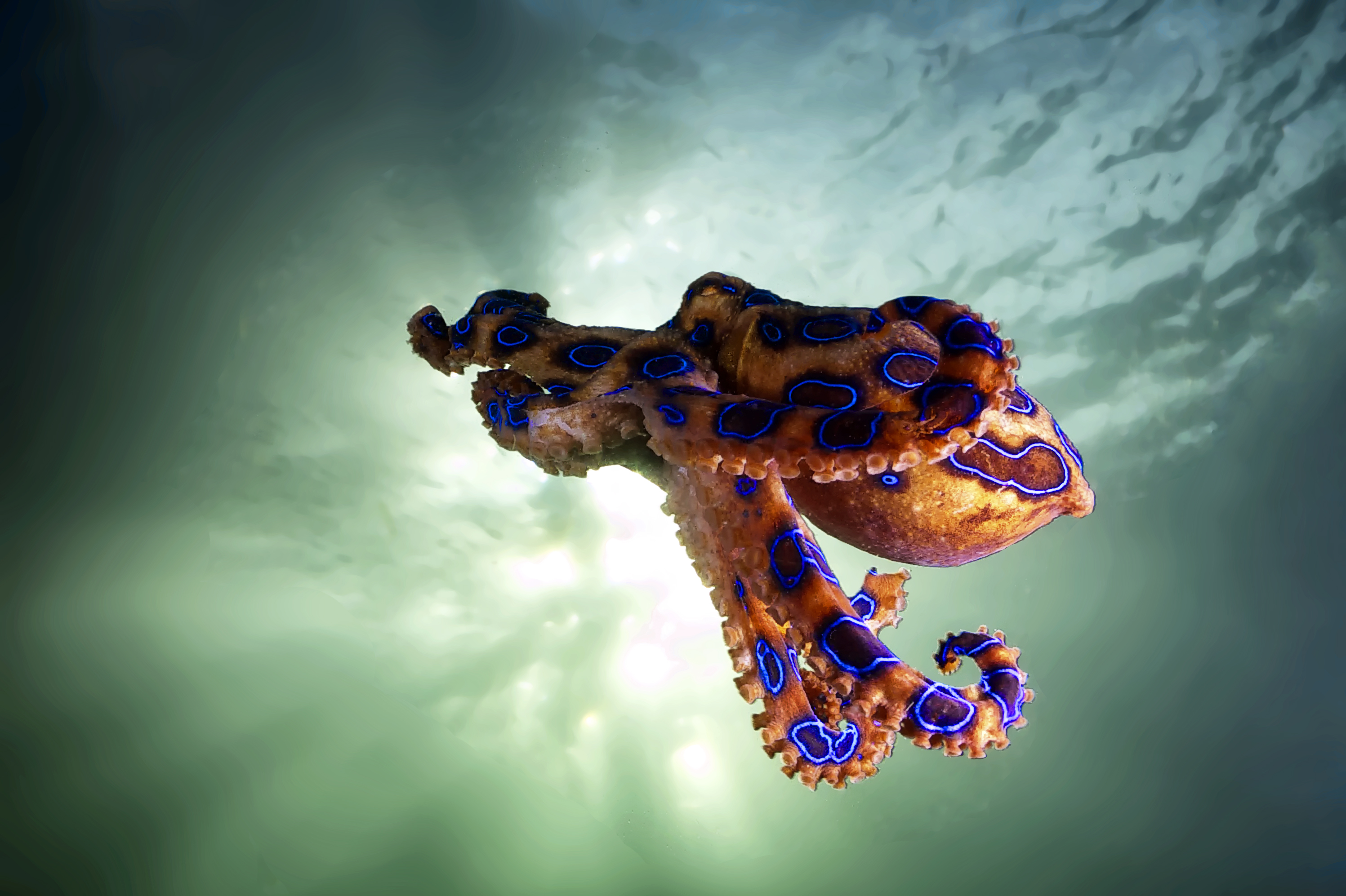Blue-ringed octopus, one of the most toxic animals on Earth, bites woman multiple times
An unnamed woman was bitten twice by a blue-ringed octopus, which contains one of the most dangerous neurotoxins on the planet, but she escaped relatively unharmed.
A woman in Australia was recently bitten multiple times by a blue-ringed octopus — one of the world's most toxic animals — and lived to tell the tale.
Blue-ringed octopuses are a group comprising four species: the greater blue-ringed octopus (Hapalochlaena lunulata), the southern blue-ringed octopus (Hapalochlaena maculosa), the blue-lined octopus (Hapalochlaena fasciata) and the common blue-ringed octopus (Hapalochlaena nierstraszi). These octopuses are small enough to fit in the palm of your hand and are covered in tiny rings that flash with an iridescent blue when the animals are threatened. Blue-ringed octopuses also contain tetrodotoxin, a powerful neurotoxin that can paralyze and kill humans even in small doses.
On March 16, the woman was bitten twice on her abdomen by an unknown species of blue-ringed octopus at a beach near Sydney in New South Wales (NSW), Australia. She had collected a small shell while swimming, and when she picked it up to look at it, the tiny cephalopod fell out and landed on her stomach, the NSW Ambulance service wrote on Facebook.
The woman experienced some abdominal pain and was treated with cold compresses before being taken to the hospital to be monitored for more symptoms, according to NSW Ambulance. It is unclear why the woman escaped relatively unharmed.
Related: 30 unusual poisonous animals
Tetrodotoxin stops nerves from signaling to muscles by blocking sodium ion channels. This causes rapid weakening and paralysis of muscles, including those of the respiratory tract, which can lead to respiratory arrest and death. The effects of tetrodotoxin can occur rapidly or have a delayed onset, so death can occur anywhere between 20 minutes and 24 hours after the toxin enters the body, according to the Centers for Disease Control and Prevention (CDC).
There is no known antidote for tetrodotoxin. All health care practitioners can do is provide supportive care or use a ventilator if patients are unable to breathe, according to the CDC.
Get the world’s most fascinating discoveries delivered straight to your inbox.
Blue-ringed octopuses do not create tetrodotoxin themselves. Instead, the toxin is produced by symbiotic bacteria that live in their salivary glands, according to the Australian Institute of Marine Science. Tetrodotoxin is found throughout the octopus's tissues, not just in specific venom glands, which makes them some of the few animals that are both poisonous and venomous. It also means that a person can receive a lethal dose if one of these octopuses touches their skin.
Despite being so toxic, blue-ringed octopuses have caused only three confirmed deaths, according to WebMD.
The iridescent blue rings that flash on the octopuses' bodies warn predators of their toxicity. They can flash their rings in less than 0.4 seconds, thanks to tiny color-changing organs called chromatophores, which are dotted across the animals' skin.
While blue-ringed octopuses rarely kill people, there have been plenty of close calls.
In 2006, a 4-year-old boy was almost killed after being bitten by an octopus he picked up in a rock pool on a beach in Queensland. The boy vomited several times before developing blurred vision and then losing control of most of his muscles, according to a case report published in the journal Clinical Toxicology. After spending 17 hours on a ventilator, he eventually made a full recovery.
And in March 2021, a woman was heavily criticized online after sharing a video of herself holding a blue-ringed octopus in Bali, although she did not know it was highly toxic at the time and escaped unscathed, according to Insider.
Blue-ringed octopuses aren't the only animals that contain tetrodotoxin; it can be found in some newts, frogs and puffer fish.

Harry is a U.K.-based senior staff writer at Live Science. He studied marine biology at the University of Exeter before training to become a journalist. He covers a wide range of topics including space exploration, planetary science, space weather, climate change, animal behavior and paleontology. His recent work on the solar maximum won "best space submission" at the 2024 Aerospace Media Awards and was shortlisted in the "top scoop" category at the NCTJ Awards for Excellence in 2023. He also writes Live Science's weekly Earth from space series.
 Live Science Plus
Live Science Plus







